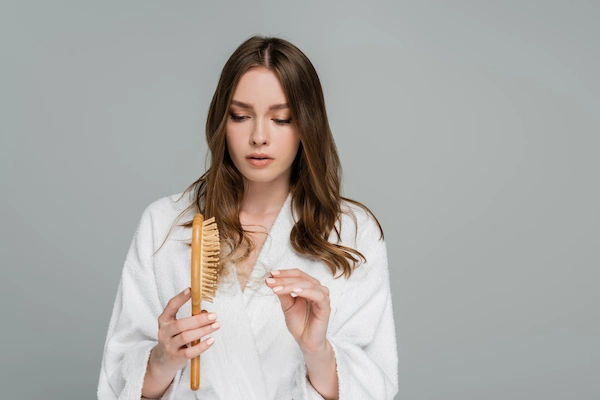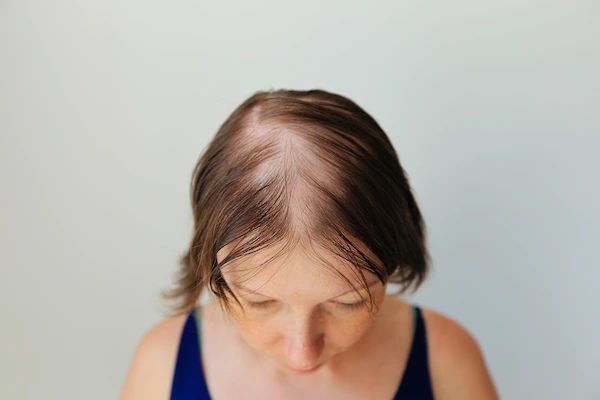Understanding DHT: Levels and Effects
Understand DHT (dihydrotestosterone), its role in the body, normal levels, and effects. Learn how DHT impacts hair loss, prostate health, and overall hormonal balance.

Written by Dr. Rohinipriyanka Pondugula
Reviewed by Dr. Shaik Abdul Kalam MD (Physician)
Last updated on 13th Jan, 2026

Introduction
If you’ve ever wondered about hair loss, acne, or other hormonal changes, you may have heard of DHT (Dihydrotestosterone). This hormone plays a significant role in the body, but imbalances can lead to various health concerns. In this article, we’ll break down what DHT is, how it affects your body, and what you can do to manage its levels.
What is DHT?
DHT is a natural hormone derived from testosterone, the primary male sex hormone (though women also have small amounts). An enzyme called 5-alpha reductase converts testosterone into DHT, which is much more potent.
Consult an Endocrinologist for the best advice
Why is DHT Important?
Hormones play a vital role in many body functions. DHT is important for:
- Development: DHT is essential for male sexual development during puberty, including deepening of the voice, facial hair growth, and prostate development.
- Hair Growth & Loss: While it promotes beard and body hair, it can also shrink hair follicles on the scalp, leading to
male/female pattern baldness. - Skin Health: High DHT levels may contribute to acne and oily skin.
- Prostate Health: Excess DHT can enlarge the prostate, causing urinary issues.
Symptoms of High or Low DHT
Imbalances in DHT levels can affect health in different ways. Here are the symptoms of high or low DHT:
High DHT Levels
- Hair thinning or baldness (especially at the temples and crown)
- Excessive facial/body hair (in women, this may indicate PCOS)
- Oily skin and acne
- Prostate enlargement (difficulty urinating in men)
Low DHT Levels
- Delayed puberty (in males)
- Reduced body/facial hair growth
- Low libido
What Causes DHT Imbalance?
Several factors influence DHT levels:
- Genetics – Some people are genetically prone to higher DHT sensitivity.
- Age – DHT levels peak in early adulthood and may decline with age.
- Hormonal Disorders – Conditions like PCOS (Polycystic Ovary Syndrome) in women can increase DHT.
- Medications – Certain steroids or hormone therapies may alter DHT.
- Lifestyle Factors – Stress, poor diet, and lack of exercise can impact hormone balance.
How Does DHT Affect Health?
DHT influences several body functions, from hair growth to reproductive health.
Hair Loss (Androgenetic Alopecia)
DHT binds to hair follicles, shrinking them over time, leading to thinner, shorter hair and eventual baldness. This affects
both men and women, though patterns differ.
Skin Issues
High DHT increases sebum (oil) production, leading to acne and inflammation.
Prostate Problems
In men, excess DHT can cause Benign Prostatic Hyperplasia (BPH), leading to frequent urination or difficulty emptying the bladder.
Impact on Women
Women with high DHT may experience:
- Facial hair growth (hirsutism)
- Irregular periods (due to PCOS)
- Scalp hair thinning
Managing DHT Levels
Balanced hormone levels are key to good health. Here are some ways of managing DHT levels:
Medical Treatments
- 5-Alpha Reductase Inhibitors (e.g., Finasteride, Dutasteride) – Block DHT production.
- Topical Solutions (Minoxidil) – Stimulates hair growth but doesn’t reduce DHT.
- Anti-Androgens (for women with PCOS) – Spironolactone helps lower DHT effects.
Natural & Lifestyle Approaches
1. Diet Changes
- Zinc-rich foods (pumpkin seeds, oysters) help regulate hormones.
- Saw Palmetto (a natural DHT blocker) may support hair health.
- Green tea contains compounds that may reduce DHT.
2. Stress Management
- High stress increases cortisol, which can disrupt hormone balance.
3. Regular Exercise
- Helps maintain healthy testosterone and DHT levels.
4. Scalp Care
- Gentle massages and avoiding harsh chemicals can support hair health.
When to See a Doctor?
If you notice:
- Sudden or severe hair loss
- Unwanted facial hair (in women)
- Persistent acne or oily skin
- Urinary problems (in men)
Consult a doctor to check hormone levels. You can easily book a consultation or lab test through Apollo 24|7 for personalised advice.
Get Your Health Assessed
Conclusion
DHT is a crucial hormone, but imbalances can lead to hair loss, acne, and other concerns. While genetics play a role, lifestyle changes and medical treatments can help manage its effects. If you suspect a DHT-related issue, don’t hesitate to seek professional guidance.
Consult an Endocrinologist for the best advice
Consult an Endocrinologist for the best advice

Dr. Ramya Varada
Endocrinologist
10 Years • MD, DM
Chinagadila
Apollo Hospitals Health City Unit, Chinagadila
(150+ Patients)

Dr. Amrutha G
General Physician/ Internal Medicine Specialist
10 Years • MBBS,DNB(family medicine), Diabetologist-CCEBDM,CCGDM
Bengaluru
Apollo Clinic, Sarjapur Road, Bengaluru

Dr. Anand Ravi
General Physician
2 Years • MBBS
Bengaluru
PRESTIGE SHANTHINIKETAN - SOCIETY CLINIC, Bengaluru

Dr Ahmed Sayeed
General Physician/ Internal Medicine Specialist
26 Years • MBBS, M.D (GENERAL MEDICINE), MRCP (UK)
Bengaluru
Apollo Clinic, JP nagar, Bengaluru
(25+ Patients)

Dr. Chaithanya R
Internal Medicine Specialist Diabetologist
16 Years • MBBS, MD Internal Medicine, Fellowship in Diabetes(UK), CCEBDM(PHFI)
Bangalore
Apollo Clinic Bellandur, Bangalore
(75+ Patients)
Consult an Endocrinologist for the best advice

Dr. Ramya Varada
Endocrinologist
10 Years • MD, DM
Chinagadila
Apollo Hospitals Health City Unit, Chinagadila
(150+ Patients)

Dr. Amrutha G
General Physician/ Internal Medicine Specialist
10 Years • MBBS,DNB(family medicine), Diabetologist-CCEBDM,CCGDM
Bengaluru
Apollo Clinic, Sarjapur Road, Bengaluru

Dr. Anand Ravi
General Physician
2 Years • MBBS
Bengaluru
PRESTIGE SHANTHINIKETAN - SOCIETY CLINIC, Bengaluru

Dr Ahmed Sayeed
General Physician/ Internal Medicine Specialist
26 Years • MBBS, M.D (GENERAL MEDICINE), MRCP (UK)
Bengaluru
Apollo Clinic, JP nagar, Bengaluru
(25+ Patients)

Dr. Chaithanya R
Internal Medicine Specialist Diabetologist
16 Years • MBBS, MD Internal Medicine, Fellowship in Diabetes(UK), CCEBDM(PHFI)
Bangalore
Apollo Clinic Bellandur, Bangalore
(75+ Patients)





